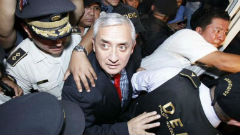Profits from customs fraud and contraband in Guatemala amounted to almost $2.3 billion in 2015 according to a new report, highlighting how commercial crime networks extend far beyond the operations of the disgraced former government.
According to the investigation carried out by the Investigation and Social Studies Association (Asociación de Investigación y Estudios Sociales – ASIES) (pdf), profits from contraband and customs fraud were equivalent to 3.5 percent of the country’s GDP in 2015, affecting 12.8 percent of the country’s imports.
The sectors worst hit were rice and corn, with 25 percent of the market affected, followed by poultry and eggs, textiles, and shoes, all with 18 percent of the market affected, the report estimates.
Although ASIES states its methodology did not allow it to distinguish between contraband and customs fraud in their calculations, the report provides rough estimates extrapolated from the investigations into “La Linea” — the massive customs fraud ring allegedly run by ex-President Otto Pérez Molina and other high ranking government officials.
According to these investigations, the money siphoned off by La Linea from the movement of goods through the country’s three principal customs zones was equivalent to 1.6 percent of GDP in 2014. By expanding this to the country’s seven main zones, ASIES estimates customs fraud profits amount to approximately 1.8 percent of GDP, leaving contraband profits standing at 1.7 percent for 2015.
A more long-term analysis of this issue suggests these levels of commercial crime did not begin and will not end with La Linea and the administration of the now imprisoned Pérez Molina, the report concludes.
“The problem persists from some time back, and the criminal structures in charge of these operations are not limited to the officials and contacts of the previous government, but reach much further,” it states.
InSight Crime Analysis
The figures provided by ASIES are rough approximations, but they nevertheless offer a glimpse of the astonishing levels to which commercial crime and corruption have penetrated the Guatemalan economy.
While it is clear these practices did not start with Perez Molina and La Linea, the question now facing Guatemala is if it can be ended or at least curbed with the prosecution of the former president and his allies.
SEE ALSO: Guatemala Elites and Organized Crime
Guatemala has made serious advances in this area but, as ASIES highlights, these practices are long-standing, firmly entrenched in the economy and among political elites, and will be difficult to uproot completely.
The scale of the task reformers face was underlined in December of last year, when accusations surfaced that Perez Molina and his allies have continued to run criminal activities and influence high-level officials from their prison cells. Skepticism of a new dawn for Guatemala has also been fueled by the recent arrests on corruption charges of family members of current President Jimmy Morales, who was elected on an anti-corruption platform.

